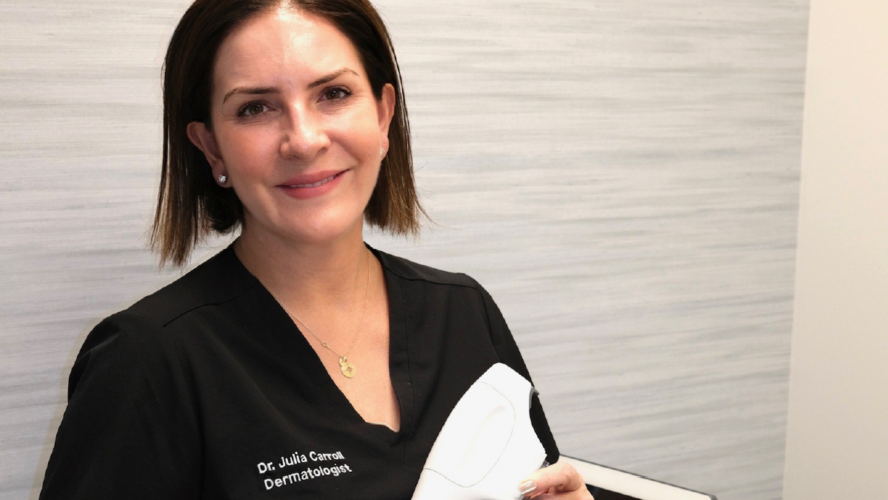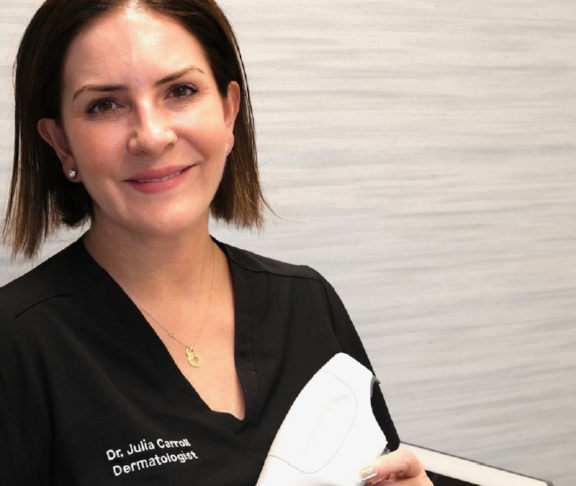
In your experience, how can dermatology support people in feeling more confident when managing visible skin conditions like acne, rosacea, or eczema?
As dermatologists, I often say we’re confidence doctors. Conditions like acne, rosacea, and eczema are visible, but they’re also deeply emotional. Dermatology helps people feel seen, literally and figuratively. When someone comes in with a flare-up or skin concern, our job is to offer a clear, science-backed plan that replaces the confusion of online advice. That alone can be incredibly reassuring.
Sometimes, just hearing “this isn’t your fault” is a confidence booster in itself. Whether it’s calming rosacea, soothing eczema, or treating acne, when patients start to see improvement, they also regain a sense of control and self-esteem.

With so much skincare content online, what’s one myth you find yourself correcting most often?
One of the biggest misconceptions I hear, especially on platforms like TikTok, is that retinol thins the skin. In fact, it does the opposite. Retinol actually stimulates collagen production, which strengthens and thickens the skin over time. While there can be some initial dryness or peeling, that’s just your skin adjusting. It’s like starting a new fitness routine, you ease into it and the long-term results are worth it.

Is there a right age to start retinol?
It depends on the reason you’re using it. Retinol was originally developed as an acne treatment, so I prescribe it to many teens with acne. If you’re using it purely for anti-aging, I typically recommend starting in your twenties. Teens don’t need to be reaching for anti-aging products, they need targeted care, not trend-driven routines.

Are there other common skincare myths you find yourself addressing regularly?
Yes, another popular one is that drinking lots of water will hydrate dry skin. Hydration is important for overall health, of course, but your skin is a barrier. Its job is to keep what’s inside in and what’s outside out. So, drinking more water isn’t going to “hydrate” your epidermis in the way people assume.
Dry skin is more about what you’re doing to your skin, whether you’re over-cleansing, using harsh products, or skipping moisturizers that protect your barrier. Drinking water won’t reverse that damage.

What’s the difference between drugstore and medical-grade skincare—and how can someone tell what’s worth the investment?
Medical-grade skincare generally has higher concentrations of active ingredients and is supported by clinical studies. But that doesn’t mean you have to spend a fortune. I always compare skincare to wine, there are good options at every price point if you know what to look for.
For more advanced concerns like sun damage or pigmentation, medical-grade products can be more effective. But for basics, like gentle cleansers or moisturizers, drugstore products often work beautifully.
The most important thing? Read the label. Look for percentages next to active ingredients like retinol or vitamin C. Don’t just buy for the brand name, buy for what’s inside.

For someone overwhelmed by products, where should they start?
I always suggest starting with what I call the Core Four:
- A gentle cleanser that won’t strip the skin
- A moisturizer that hydrates without being greasy
- Sunscreen, every single day
- A targeted treatment (optional), such as retinol, vitamin C, or a brightening serum based on your goals
Skincare doesn’t need to be 10 complicated steps. You want to build a strong foundation and develop consistency. Once that’s in place, you can layer in extras if your skin needs them. Too many people are layering five different serums, each with a single ingredient. I like to call that “skincare soup.” Not only can it cause irritation, but the skin can only absorb so much at once. You’ll often get better, and cheaper, results from one well-formulated product than five trendy ones.

If you could get every Canadian to adopt one lifelong skincare habit, what would it be?
Wear sunscreen. Rain, snow, or shine, UV damage is cumulative. It builds up over time, and often, it’s invisible until it’s not. That might show up as brown spots, wrinkles, thinning skin, or in the worst cases, skin cancer.Sunscreen is like brushing your teeth. It’s a simple daily habit that prevents long-term problems, and it’s the most effective anti-aging product we have.

Do you have any tips for making sunscreen application easier?
Yes! I always say your face ends at your chest—don’t forget your neck, chest, arms, and hands. The easiest time to apply sunscreen is right after you step out of the shower, before getting dressed. That way, you don’t miss key areas.
And for those who think sunscreen feels like a chore: there’s a formula out there for everyone. Some prefer tinted sunscreens, some like powders, and some love sticks. It’s about finding the one that fits your lifestyle.

You mentioned the connection between stress and skin health—can you elaborate on that?
There’s a growing awareness of the skin-mind connection. Stress may not cause skin conditions, but it can definitely flare them. particularly conditions like eczema, acne, and psoriasis. Then the flare-up itself adds more stress, which creates a loop.
Your brain and your skin are constantly communicating, that’s why I often take a holistic approach. In some cases, combining medical treatments with mindfulness practices, sleep support, or even therapy can help improve both your skin and your quality of life.

How is dermatology evolving when it comes to diversity and aging?
We’re starting to see more emphasis on skin equity. Not all skin tones react the same way to products or treatments, yet clinical trials have historically underrepresented people with darker skin. That’s changing, but there’s still work to be done.
When it comes to aging, I’ve seen a refreshing shift in mindset. My patients aren’t asking to look younger; they want to look rested, healthy, and vibrant. They’re focusing more on skin quality than chasing perfection. Tools like lasers, Botox, or injectables can help, but they’re part of a broader plan that includes skincare, prevention, and balance. It’s not about fighting aging. It’s about aging well.


